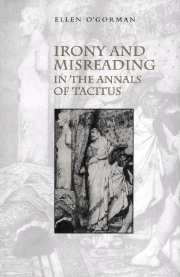Book contents
- Frontmatter
- Contents
- Dedication
- Preface
- 1 Introduction: irony, history, reading
- 2 Imperium sine fine:problems of definition in Annals 1
- 3 Germanicus and the reader in the text
- 4 Reading Tiberius at face value
- 5 Obliteration and the literate emperor
- 6 The empress's plot
- 7 Ghostwriting the emperor Nero
- 8 Conclusion: the end of history
- Bibliography
- General index
- Index locorum
3 - Germanicus and the reader in the text
Published online by Cambridge University Press: 30 September 2009
- Frontmatter
- Contents
- Dedication
- Preface
- 1 Introduction: irony, history, reading
- 2 Imperium sine fine:problems of definition in Annals 1
- 3 Germanicus and the reader in the text
- 4 Reading Tiberius at face value
- 5 Obliteration and the literate emperor
- 6 The empress's plot
- 7 Ghostwriting the emperor Nero
- 8 Conclusion: the end of history
- Bibliography
- General index
- Index locorum
Summary
The desire of the text is ultimately the desire for the end, for that recognition which is the moment of the death of the reader in the text. Yet recognition cannot abolish textuality, does not annul that middle which is the place of repetitions, oscillating between blindness and recognition, between origin and ending. Repetition toward recognition constitutes the truth of the narrative text.
Peter Brooks, Reading for the PlotGenealogy is one cluster within a society's ideological apparatus through which pressure is brought to bear toward realizing a future in conformity with a valued representation of the past.
John Henderson, Figuring out Roman NobilityGermanicus is an important figure in Tacitus' narrative, because his position in the history of the principate raises crucial questions about how meaning is created in the interplay between past and present. It is generally accepted that the tradition about Germanicus, to which Tacitus is contributing in Annals 1–2, has its source in writings from the reign of Caligula, the son of Germanicus. As the father, brother and grandfather of three successive Julio-Claudian emperors, Germanicus acquires historical significance retrospectively. According to which sort of history you read, he either foreshadows the greatness of his successors or represents the virtues which they pervert.
As an addition to this perspective on Germanicus, readers of Tacitus have remarked on the extent to which Germanicus seems out of place in the Tiberian regime.
- Type
- Chapter
- Information
- Irony and Misreading in the Annals of Tacitus , pp. 46 - 77Publisher: Cambridge University PressPrint publication year: 2000



